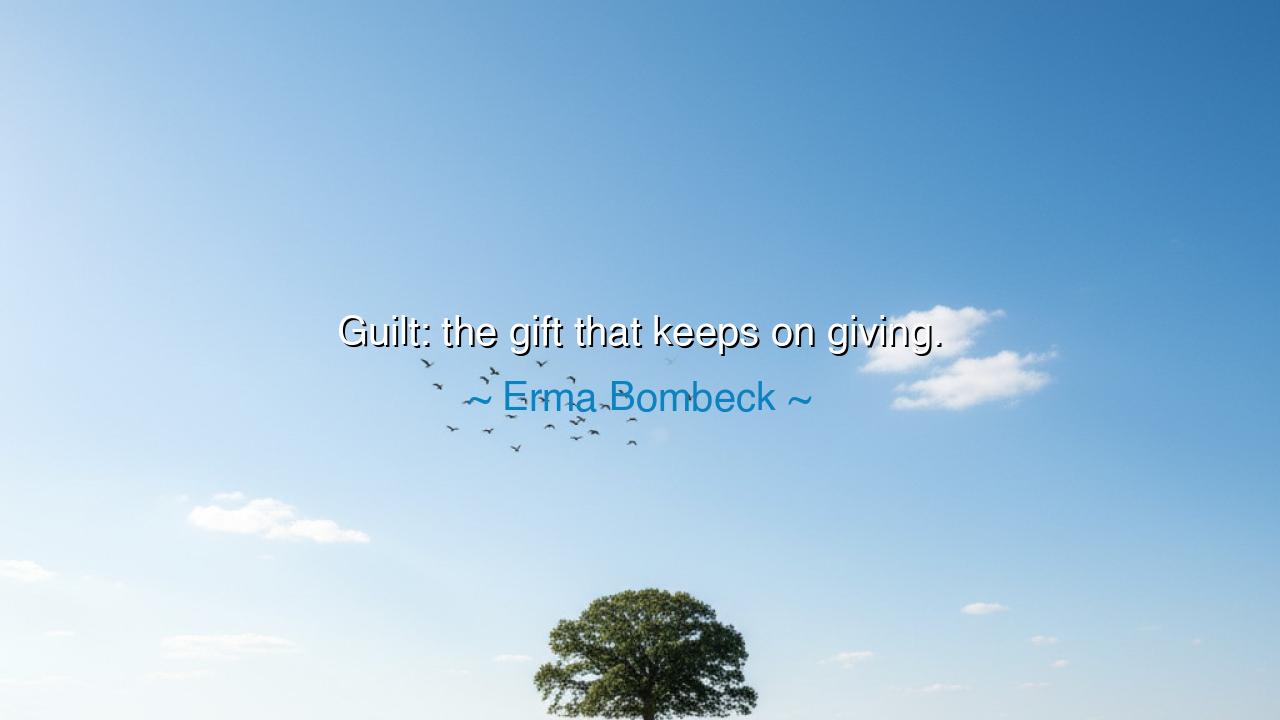
Guilt: the gift that keeps on giving.






"Guilt: the gift that keeps on giving." – Erma Bombeck
In the grand theater of human emotions, few forces are as persistent and unrelenting as guilt. Erma Bombeck, with her characteristic wit and insight, captures the essence of this emotion, revealing it not as a fleeting feeling but as something that lingers, haunts, and continues to exert influence long after the initial cause has passed. Guilt is a gift, but not the kind we would ever wish to receive. Like a persistent echo in the soul, it reverberates, reminding us of past missteps, of actions unwise, and of words left unsaid. It is a gift that does not fade with time but continues to reappear, each time with a new form and a new weight, keeping us bound to our past transgressions.
In ancient times, guilt was often seen as a sacred burden—a force that weighed on the heart and soul. The Greeks, in particular, spoke of nemesis, the goddess of retribution, who brought balance by ensuring that those who committed wrongs felt the sting of consequence. But in this ancient understanding, guilt was not merely a feeling; it was a force of nature, a moral law that ensured justice. Much like nemesis, Bombeck’s quote reminds us that guilt is an ongoing force—it does not simply pass, but persists, shaping us, guiding us back to the very actions that caused it in the first place. It is as though the gods themselves have seen fit to gift us with this endless reminder, to ensure that we never forget our misdeeds.
Consider the story of Orestes, the son of Agamemnon in Greek mythology, who, after avenging his father’s death by killing his mother, was pursued by the relentless Furies, ancient beings who represented the punishment of guilt. Orestes' guilt for matricide did not cease once the deed was done; instead, it haunted him, chasing him across lands, tormenting him with its weight. The Furies were not merely a physical threat but a manifestation of Orestes’ inner turmoil—a representation of the way that guilt refuses to let go. Bombeck’s words, though more modern in tone, capture this ancient reality: guilt is not a single act, but a gift that, once given, keeps on giving, often becoming more than just an emotion—it becomes a companion, a presence that walks with us through life.
The power of guilt lies not only in its emotional toll but in its ability to shape future decisions. Just as Orestes was bound by his actions, so too are we often bound by the choices we make, even long after the immediate consequences have passed. It is guilt that shapes how we move forward, how we atone, and how we deal with the consequences of our actions. Bombeck’s quote reminds us of the complex nature of this emotion: while guilt may be seen as something negative, it also serves a purpose. It acts as both punishment and teacher, guiding us to acknowledge our mistakes, to seek forgiveness, and to change.
In a more practical sense, consider the lives of great leaders like Nelson Mandela, who, though burdened by the years of apartheid and his time in prison, carried a sense of guilt not just for his personal actions but for the injustices that his people had endured. Yet, Mandela's guilt did not consume him; it drove him to fight for reconciliation and freedom. His guilt was the fire that fueled his desire for justice, but he used it as a motivator, not a shackle. In his case, guilt became a gift that, though persistent, led him to a life of greater purpose. This is the key: while guilt may persist, we must choose how we allow it to affect us—whether we become victims of it or whether we use it as a force for growth.
In our own lives, Bombeck’s words teach us a crucial lesson: that guilt is an inevitable part of the human experience, a gift that comes with every wrong decision and unwise action. It is a feeling that cannot be easily dismissed but must be confronted and understood. The true lesson lies not in avoiding guilt but in learning how to use it. Guilt can lead us to growth if we use it as a teacher, guiding us to make better choices and to seek reconciliation with those we may have wronged. However, we must also avoid allowing it to paralyze us or to hold us hostage. We must release the past mistakes, not as a way to forget them, but to learn from them and move forward with wisdom and humility.
Thus, let us embrace the gift of guilt not as a punishment but as a guide, a force that urges us to become better, more mindful individuals. It will come, as it must, but it is how we respond that determines whether we remain in its grasp or rise above it. Let guilt shape us into people who seek not just to avoid error, but to face our imperfections and grow stronger through them. And in this way, we shall turn the gift of guilt into the wisdom that enriches our journey through life.






AAdministratorAdministrator
Welcome, honored guests. Please leave a comment, we will respond soon